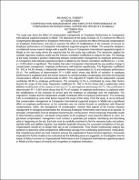| dc.description.abstract | The study was about the effect of compensation management on Employee Performance in Compassion International supported projects in Mbale. The objectives of the study included: (i) To examine the effect of Compensation Management on Employee Performance, (ii) to examine the effect of financial compensations on Employee Performance, and (iii) to examine the effect of modifications in the contracts of service on Employee performance in Compassion International supported projects in Mbale. The researcher adopted a co-relational survey research design with a specific focus on Compassion International supported projects in Mbale as the case study where the required data for this study was collected. The researcher applied the multiple regression analysis model and the Pearson correlation coefficient to analyze the data. The findings of the study revealed a positive relationship between compensation management on employee performance in Compassion International supported projects in Mbale by the Pearson correlation coefficient as r = 0.764, p = 0.000 which is significant. This implies that when Compassion International has any positive change in compensation management, employee performance will improve significantly. The Regression coefficient R= .943 or 94.3% reveals a relationship between financial compensation (I.V) and employee performance (D.V). The coefficient of determination R2 = 0.889 which shows that 88.9% of variation in employee performance is explained when the human resource is commensurately compensated, and when the financial compensations offered are commensurate to effort. The Adjusted R2 implies that the independent variable contributes 88.9% to employee performance. The remaining 11.1% is contributed by some other factors beyond the scope of this study. Regression coefficient R= .952 or 95.2% shows that a relationship exists between modification of the contract of service (I.V’s) and employee performance (D.V). The coefficient of determination R2 = 0.907 which shows that 90.7% of variation in employee performance is explained when the modifications in the contracts of service give the employer an advantage over the employees. The Adjusted R2 implies that the independent variable contributes 90% to employee performance. The remaining 10% is contributed by some other factors beyond the scope of this study. From the study, it can be deduced that compensation management at Compassion International supported projects in Mbale had a significant effect on employee performance, as the contention was not mainly focused on satisfaction with financial compensations, rather, the management of compensation. Several vital aspects of the Human resource management in managing compensation for enhancing Employee Performance were found to be ignored. In principle, compensation must be designed around the job, not the person. Person-based pay frequently results in discriminatory practices. Job-based compensation is the employer's most powerful defense in court. For job-based compensation, management must conduct a systematic job analysis, identifying and describing what is happening on the job. Each job must be carefully examined to list the necessary tasks and actions, identify skills and abilities required, and establish desirable behaviors for successful completion of the job. Organizations should try to design their pay as per Competencies. They should continuously analyze key positions to determine what competencies differentiate average from outstanding performance. Particularly; that competencies which are most critical to achieve the organization's future focused objectives. It becomes imperative for further studies to be conducted and the following areas are suggested; an investigation into the impact of labour turnover on Organizational Performance at the Compassion International supported projects in Mbale and the impact of rewards and recognition in employee motivation. | en_US |

